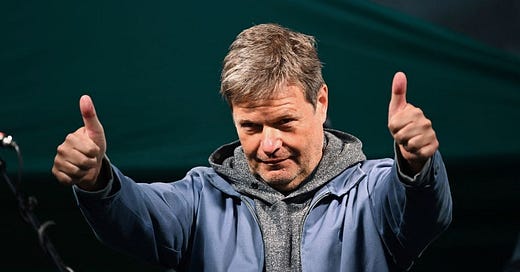Germany Lied About The Nuclear Phaseout
Government documents reveal shocking green dishonesty
In 2018, everyone laughed at Donald Trump—German politicians actually laughed in his face—when he suggested that Germany would “become totally dependent on Russian energy if it does not immediately change course” at a UN conference. Just four years later, Russia rolled into Ukraine and the German government had to do something it had spent a decade avoiding: ask itself hard questions about its energy policy.
Since 2011, in the aftermath of the Fukushima Daichi meltdown, Germany threw its shoulder into phasing out its nuclear fleet. And this had indeed led to a deeper reliance on Russia, with imports comprising “up to 55 percent of gas and 34 percent of oil supplies.” But in the following years, Germany had become vulnerable to an energy crunch because of an over-investment in renewables and underinvestment in fossil fuels that collided with wind droughts and depleted fossil fuel reserves. The outbreak of the Ukraine War only tipped the country over the edge.
Now that the geopolitical deck had been re-shuffled, did Germany really want to continue its nuclear closures? In a piece out from German magazine Cicero, journalist Daniel Gräber exposes how members of the Green Party, including Minister Robert Habeck, colluded to mislead the German public, claiming that nuclear was too expensive and too dangerous to keep, despite the government’s internal analysis that nuclear was both cheap and safe to continue operating.1 So, they lied. And closed the plants anyway.
“Their aim from the outset was to prevent an exit from the phase-out. No matter what the cost,” writes Gräber.
No matter the cost indeed. In 2022, the German government shelled out 200 billion euros in subsidies to ease the pain of the energy crunch. Nuclear wouldn’t have abated all of that, but closing the plants didn’t help. And now, some of the greatest nuclear plants the world has ever seen lie cold and dead on German soil. What a tragic state of affairs.
But here’s a potential silver lining: support for nuclear energy in Germany has grown. In 2021, half the country endorsed keeping the plants on line. In the wake of the revelations from Cicero, a vital opportunity has arrived for the other half of the population to change their minds. If the scales fall from any anti-nuke’s eyes, that’s a boon. Who can blame many of them for misjudging the situation? Energy and electricity confound even the most seasoned of experts—they’re complex topics. Besides, the Green Party abused the authority of the state to deceive the country into an energy crunch while hobbling the country’s industrial base. If some anti-nukes can be won over, their new course could make it politically possible to restart some of those plants—so long as it’s also technically feasible.






€200bn in subsidies for one energy crisis? South Korea could build 6 Barakahs for that cost. 24 reactors.